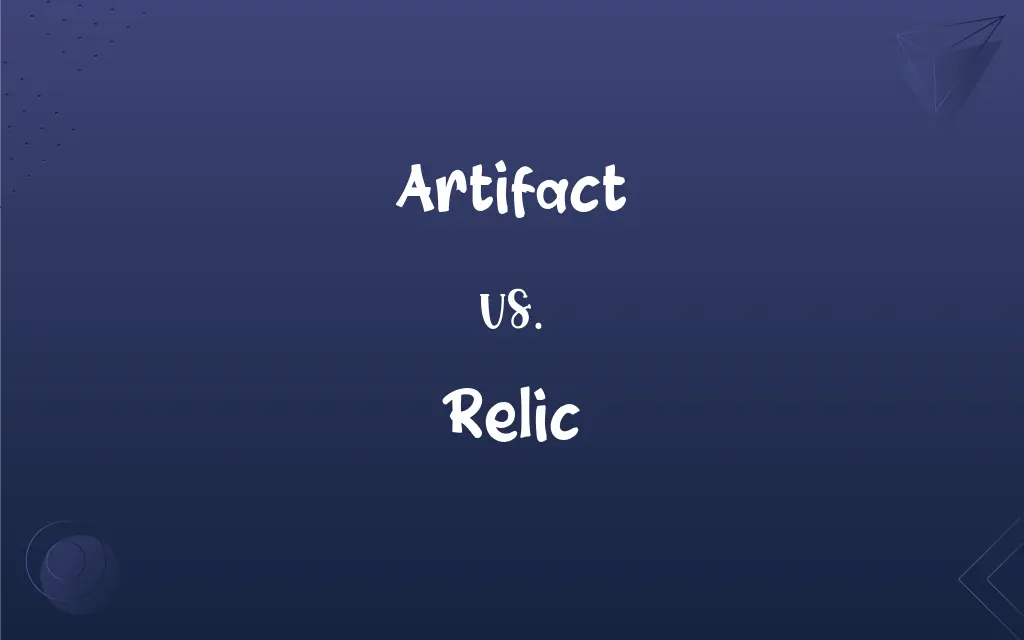Artifact vs. Relic: What's the Difference?
Edited by Harlon Moss || By Janet White || Updated on October 19, 2023
"An Artifact is a man-made object from the past, often historical or cultural, while a Relic is an object, typically a part of something, revered for its connection to a saint or deity."

Key Differences
An "Artifact" is generally any item made by humans that reflects cultural or historical interest, often found during archaeological excavations. In contrast, a "Relic" is more specifically an object of religious reverence, typically something associated with a saint, a religious leader, or a deity, and is often a surviving piece of something older.
In terms of cultural significance, an "Artifact" can be anything from ancient pottery to tools that shed light on early human life and activities. A "Relic," however, is often valued not just for its age or rarity but for its spiritual implications and emotional connection to the divine or the sacred.
The preservation of an "Artifact" is usually aimed at understanding a particular period in history or a specific culture, helping archaeologists and historians piece together human activities from the past. On the other hand, a "Relic" is preserved mainly for religious veneration and is often kept in a shrine or a place of worship.
From a visitor's perspective, an "Artifact" is typically displayed in museums or galleries and can encompass a wide range of items, from art to everyday objects from the past. In contrast, a "Relic" is more likely to be found in religious sites and is an object of pilgrimage and devotion.
While both "Artifacts" and "Relics" connect us to the past, the nature of their importance varies. An "Artifact's" significance lies in its ability to educate about past civilizations, whereas a "Relic's" importance is deeply rooted in faith, spirituality, and religious practices.
ADVERTISEMENT
Comparison Chart
Definition
Man-made historical object
Object revered for religious connection
Significance
Cultural, historical
Spiritual, religious
Common Locations
Museums, archaeological sites
Religious sites, shrines
Purpose
Education, historical insight
Veneration, pilgrimage
Connection
To past human activity
To a saint, deity, or sacred event
ADVERTISEMENT
Artifact and Relic Definitions
Artifact
Anything made or modified by human art and workmanship.
This old vase is an artifact from an unknown civilization.
Relic
A part of a deceased holy person's body or belongings, preserved for veneration.
Pilgrims traveled far to see the sacred relic.
Artifact
An object made by a human being, typically of cultural or historical interest.
The museum showcased an artifact from ancient Greece.
Relic
A thing that has survived from an earlier period or in a primitive form.
The building was a relic of the colonial era.
Artifact
An item of archaeological interest, especially one found at an excavation site.
They discovered a rare artifact while digging at the site.
Relic
Something cherished for its historical significance originating from the past.
The ancient relic was kept in a secure location.
Artifact
An object produced or shaped by human craft, especially a tool, weapon, or ornament of archaeological or historical interest.
Relic
An item of religious devotion, particularly a piece of the body or personal items of a saint.
The relic was displayed during the festival.
Artifact
Something viewed as a product of human conception or agency rather than an inherent element
"Morality is an artifact of human culture, devised to help us negotiate social relations" (Michael Pollan).
Relic
Something that has survived the passage of time, especially an object or custom whose original culture has disappeared
"Corporal punishment was a relic of barbarism" (Cyril Connolly).
Artifact
A phenomenon or feature not originally present or expected and caused by an interfering external agent, action, or process, as an unwanted feature in a microscopic specimen after fixation, in a digitally reproduced image, or in a digital audio recording.
Relic
Something cherished for its age or historic interest.
Artifact
An inaccurate observation, effect, or result, especially one resulting from the technology used in scientific investigation or from experimental error
The apparent pattern in the data was an artifact of the collection method.
Relic
An object kept for its association with the past; a memento.
Artifact
An object made or shaped by human hand or labor.
Relic
An object of religious veneration, especially a piece of the body or a personal item of a saint.
Artifact
An object made or shaped by some agent or intelligence, not necessarily of direct human origin.
Relic
Or relics A corpse; remains.
Artifact
Something viewed as a product of human agency or conception rather than an inherent element.
Relic
That which remains; that which is left after loss or decay; a remaining portion.
Artifact
A finding or structure in an experiment or investigation that is not a true feature of the object under observation, but is a result of external action, the test arrangement, or an experimental error.
The spot on his lung turned out to be an artifact of the X-ray process.
Relic
Something old and outdated, possibly kept for sentimental reasons.
Artifact
(archaeology) An object, such as a tool, ornament, or weapon of archaeological or historical interest, especially such an object found at an archaeological excavation.
The dig produced many Roman artifacts.
Relic
(religion) A part of the body of a saint, or an ancient religious object, kept for veneration.
Artifact
(biology) An appearance or structure in protoplasm due to death, the method of preparation of specimens, or the use of reagents, and not present during life.
Relic
To cause (an object) to appear old or worn, to distress.
Artifact
(computing) A perceptible distortion that appears in an audio or video file or a digital image as a result of applying a lossy compression or other inexact processing algorithm.
This JPEG image has been so highly compressed that it has unsightly artifacts, making it unsuitable for the cover of our magazine.
Relic
That which remains; that which is left after loss or decay; a remaining portion; a remnant.
The relics of lost innocence.
The fragments, scraps, the bits and greasy relics.
Artifact
(museology) Any object in the collection of a museum. May be used sensu stricto only for human-made objects, or may include ones that are not human-made.
Relic
The body from which the soul has departed; a corpse; especially, the body, or some part of the body, of a deceased saint or martyr; - usually in the plural when referring to the whole body.
There are very few treasuries of relics in Italy that have not a tooth or a bone of this saint.
Thy relics, Rowe, to this fair urn we trust,And sacred place by Dryden's awful dust.
Artifact
A product of human workmanship; - applied esp. to the simpler products of aboriginal art as distinguished from natural objects.
Relic
Hence, a memorial; anything preserved in remembrance; as, relics of youthful days or friendships.
The pearls were spilt;Some lost, some stolen, some as relics kept.
Artifact
Any product of human workmanship; - applied both to objects made for practical purposes as well as works of art. It is contrasted to natural object, i.e. anything produced by natural forces without the intervention of man.
Relic
An antiquity that has survived from the distant past
Artifact
A structure or appearance in protoplasm due to death, method of preparation of specimens, or the use of reagents, and not present during life.
Relic
Something of sentimental value
Artifact
An object, oservation, phenomenon, or result arising from hidden or unexpected causes extraneous to the subject of a study, and therefore spurious and having potential to lead one to an erroneous conclusion, or to invalidate the study. In experimental science, artifacts may arise due to inadvertant contamination of equipment, faulty experimental design or faulty analysis, or unexpected effects of agencies not known to affect the system under study.
Relic
An object surviving from an earlier time, especially one with historical or religious significance.
The relic was believed to belong to a saint.
Artifact
A man-made object taken as a whole
Artifact
A product of human craft found in a historical context.
The artifact stood as proof of advanced ancient technology.
Artifact
An object remaining from a particular period.
Among the debris, they found an artifact that was centuries old.
FAQs
Can anything old be considered an artifact?
It must be man-made with historical or cultural relevance.
What's unique about a relic?
Its religious significance and connection to the sacred.
Where are artifacts usually found?
In archaeological sites or museums.
How are relics preserved?
Often in shrines, temples, or churches.
Can modern items be artifacts?
Yes, if they reflect significant cultural aspects.
Are relics only found in religious contexts?
Primarily, but they can also have historical value.
Do all relics need to be ancient?
Not necessarily, but they must have religious importance.
Who studies artifacts?
Archaeologists, historians, and anthropologists.
What distinguishes an artifact?
It's a man-made object, often historical or cultural.
Are artifacts always valuable?
Their value lies in cultural or historical information.
Can relics be privately owned?
Rarely, as they're usually held by religious institutions.
What's the study of artifacts called?
Archaeology.
Are relics worshipped?
They're venerated, often as part of religious practices.
What makes a relic authentic?
Validation by religious or historical authorities.
Do artifacts have legal protection?
Often, under cultural heritage laws.
Can an artifact be natural?
No, artifacts are specifically man-made.
Can an artifact be recent?
Yes, if it has immediate historical or cultural significance.
Can a building be a relic?
Yes, if it's historically or religiously significant.
Who decides if something is a relic?
Religious authorities or cultural historians.
Are all relics objects?
Mostly, but they can also be places or stories.
About Author
Written by
Janet WhiteJanet White has been an esteemed writer and blogger for Difference Wiki. Holding a Master's degree in Science and Medical Journalism from the prestigious Boston University, she has consistently demonstrated her expertise and passion for her field. When she's not immersed in her work, Janet relishes her time exercising, delving into a good book, and cherishing moments with friends and family.
Edited by
Harlon MossHarlon is a seasoned quality moderator and accomplished content writer for Difference Wiki. An alumnus of the prestigious University of California, he earned his degree in Computer Science. Leveraging his academic background, Harlon brings a meticulous and informed perspective to his work, ensuring content accuracy and excellence.































































